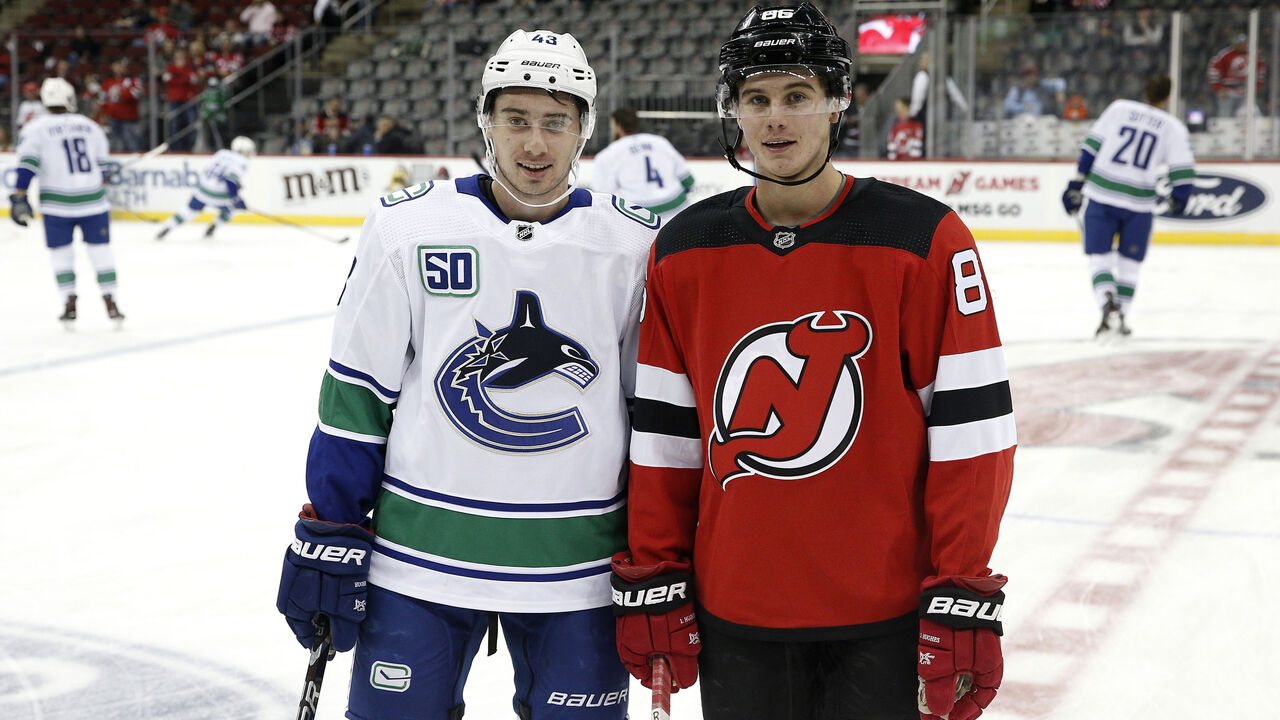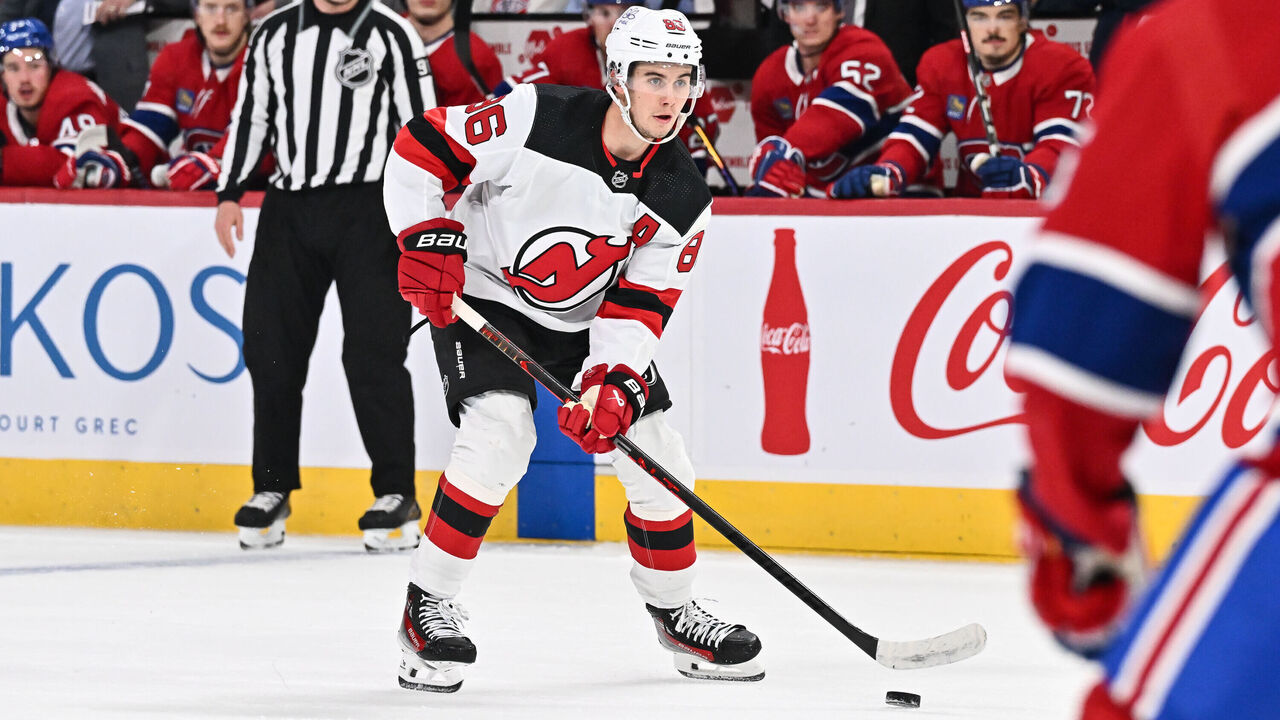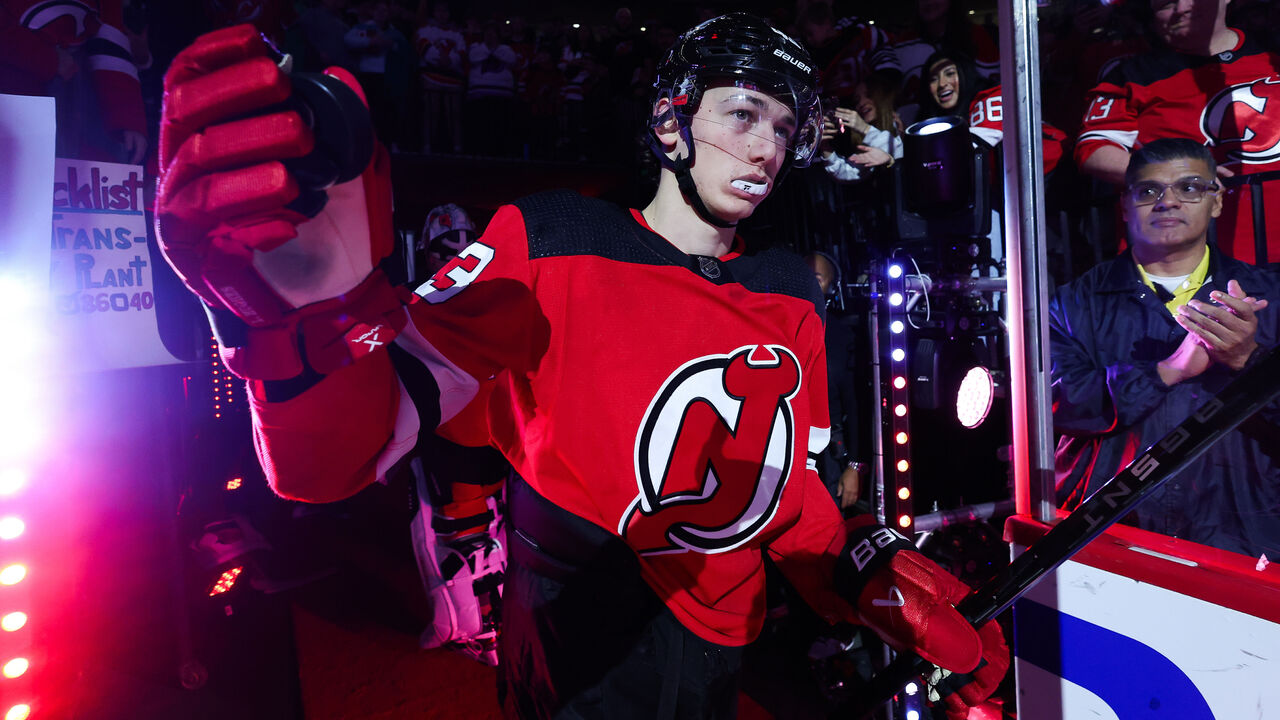How the Hughes brothers are taking over the NHL
Last Friday, Jack Hughes whipped the puck to Luke Hughes, his brother and New Jersey Devils teammate. Luke, running point on the power play, quickly returned it to the right flank. Jack moved to open ice, fired a shot, and scored.
The goal helped New Jersey defeat the Buffalo Sabres. Through Wednesday, the Devils own a respectable 5-2-1 record, Jack's positioned himself as an early Hart Trophy favorite, and Luke's in the Calder discussion.
About an hour after the give-and-go sequence, Quinn Hughes - the eldest of the three brothers - called for the puck in his game against St. Louis. His defense partner, Filip Hronek, faked a shot before making a cross-ice pass. Quinn, the Vancouver Canucks' captain, took two strides toward the net, loaded a shot, and beat the goalie through traffic.
The goal opened the scoring in Vancouver's victory. Through Wednesday, the Canucks are 6-2-1, and Quinn's a strong Norris contender.
Quinn Hughes snipes a fantastic shot off the post and in to kick off the scoring for Vancouver!#Canucks pic.twitter.com/rWY0oiFBca
— Hockey Daily 365 l NHL Highlights & News (@HockeyDaily365) October 28, 2023
The Hughes brothers are taking over the NHL in the early going of 2023-24. Quinn, the seventh overall pick in 2018, is an elite No. 1 defenseman at 24 years old. Jack, the first pick in 2019, is arguably a top-five forward on the planet at 22. Luke, selected fourth in 2021, is showing signs of future stardom at 20.
It's extremely rare for three brothers to carve out NHL careers. Two in the top 10 at their position and a third trending toward joining them? Unprecedented.
Let's take a look at how the Hughes brothers dominate - first by focusing on their shared hockey DNA, then by identifying the brothers' different strengths.
The Hughes hockey DNA
The NHL is filled with players who excel at a particular pillar of skating. One player might be an outstanding north-south skater. Another might be phenomenal laterally, zigging and zagging. A third might be awesome at speed management, slowing down and accelerating at the perfect times.
Each Hughes brother excels at all of the above; all three are exceptional north-south skaters, exceptional east-west skaters, and exceptional speed-differential skaters. It often looks like rockets are strapped to their skates. Their crossover and edge work is otherworldly. And stamina is never an issue.
"Skating is the trait that connects all three," said an NHL amateur scout who scouted each brother extensively during their draft years and beyond.
The brothers were taught how to skate by their mom, Ellen Weinberg-Hughes, a former college and U.S. women's national team player. Their dad, Jim Hughes, has also been an invaluable resource as a former college player and NHL/AHL coach. Now the director of player development for CAA Sports - the agency that represents all three brothers - Jim is regarded as one of the top skills coaches in North America.
Countless hours on outdoor hockey rinks, where unstructured games rule, helped build a formidable base for their skating. On-ice and video work with dad, consultation with mom, and world-class coaching elevated and polished it. All three spent two years at the U.S. National Team Development Program, while Quinn and Luke both spent another two at the University of Michigan.

Another defining characteristic of the Hugheses is vision. All three can read the play at an incredibly high level, which really shows in how frequently they find open ice. Jack is the Devils' offensive catalyst, with the flow of play running through him every time he's on the ice. Quinn assumes a similar role with the Canucks, albeit from the back end. Luke has the skill set of a future catalyst.
The skating and IQ are married by what the scout calls a "go-for-it mentality." There's minimal hesitation and maximal swagger in the brothers' games.
"Whenever they have the puck, they feel like they can be the guy who makes a difference," the scout summarized. "They don't back down from anybody."
The differentiating skills
Jack, the Devils' top center, has exploded out of the gates with five goals and 13 assists for 18 points in eight games while skating for 21:48 a night. He leads the league in assists and points, and his underlying data is equally notable.

Jack's second in the NHL in both zone exits per game and zone entries per game, according to Sportlogiq. A transition king who consistently keeps his head up while handling the puck, Jack rarely wastes a trip down the ice. On a per-game basis, the 5-foot-11, 175-pounder ranks first in both scoring chances generated off the rush and offensive-zone puck possession.
The scout says Jack's the smartest player among the super-smart Hughes brothers. His skating attracts the eye, but it's his brain that inflicts most of the damage. For example, Jack loves to operate between the top of the circle and blue line in the offensive zone. Multiple times a game, he'll retrieve a loose puck along the side boards and regroup up top, scanning for scoring options.
"No one uses the high ice in the offensive zone more than Jack," the scout said. "He's really pioneering it. Other guys use the high ice sometimes, but he's living there right now." Here's an example of Jack pursuing the "high ice":
#NJDevils Jack Hughes, priatelia pic.twitter.com/AfAgUvuHRf
— Samuel Grega (@samuel_grega) October 26, 2023
There's a natural difference between Jack and his brothers since he's a forward and they're defensemen. What separates Quinn from his siblings is his constant motion. That's not to say Jack or Luke are in any way inactive, it's just that Quinn might be the most active among the NHL's 700-plus skaters.
Quinn's never static or flat-footed, making him hard to account for in all three zones. His mobility also allows him to manipulate defenders in a unique way.
For instance, if the Canucks are in the offensive zone for 30 seconds, Quinn may man the point for 15 seconds, hang out in the upper slot area for five, creep below the goal line for five, and cruise around the hash marks for five. He's a calculated risk-taker who manages to remain responsible defensively. He'll probe over and over again, but it's rarely, if ever, done recklessly.
No NHLer has had the puck on his stick more often this season than Quinn - 3:22 per game. The eldest Hughes also ranks second in the league in loose-puck recoveries - 29.1 per contest.
That last data point is especially impressive because it suggests Quinn - who's listed at 5-foot-10, 180 pounds - often escapes dangerous areas unscathed. He'll happily engage in a board battle to win a 50-50 puck, yet through smarts and skating, he evades bruising body checks and thus injury.
Here Quinn Hughes creates two scoring rushes and blocks and disrupts a zone entry. Just filthy stuff.
— Wyatt Arndt (@TheStanchion) October 22, 2023
I repeat for those in the back: You don't need to throw huge hits and be 6"5 to be a Norris candidate if you have the puck on your stick all times and no one can touch you. pic.twitter.com/TK1GIHgU7R
Luke joined the Devils at the tail end of the 2022-23 regular season, then appeared in three playoff games. In 13 career games, he's racked up 10 points while skating for 19-plus minutes a night, typically on the third pair.
The scout believes Luke will blossom into a true No. 1 defenseman - and boy, wouldn't the Devils, who are loaded at forward, love that. The main difference for Luke is that he's already 6-foot-2 and 184 pounds. He has the power and length to impact the game at a basic physical level - he can be more forceful.
"Maybe a Rasmus Dahlin arc," the scout said of Luke's five-year trajectory.

One thing to remember is that the Hughes brothers don't bulk up for the sake of bulking up. Jack and Quinn are both stronger than they were as rookies but remain lean. They haven't lost any agility. Luke will likely chase the same physique. After all, despite being tall, his calling card is straight-line speed.
In fact, straight-line speed is Luke's chief differentiating skill, according to the scout. It's crazy to think that's the case given Jack's and Quinn's speed-infused highlight reels, but it's true. Luke has in his arsenal what the scout labels "running back plays." He'll weave through a defense by combining his elite skating, elite vision, and "go-for-it mentality" with his physical gifts.
"Luke's a little bit more of a downhill guy," the scout summarized.
Jack and Quinn have set the bar sky-high. But Luke's capable of joining them in whichever tier you'd like to place them at the moment - stars? Superstars?
John Matisz is theScore's senior NHL writer. Follow John on Twitter (@MatiszJohn) or contact him via email ([email protected]).